70 years of POLSTEAM
The beginnings
Polska Żegluga Morska Przedsiębiorstwo Państwowe was established under the Order of the Minister of Shipping of 2nd January 1951. Polska Żegluga Morska started its activity on the basis of the assets of two shipowners operating at that time: Gdynia-Ameryka Linie Żeglugowe S.A., (GAL), from where land employees were taken over, and Żegluga Polska, which brought its fleet to the new company.
In the initial period, the fleet of PŻM P.P. consisted of 11 ships with a total deadweight capacity of approx. 27 thousand tons. Among these vessels were: four steamers built in 1926 in the French shipyard in Blainville: s/s Toruń, s/s Kraków, s/s Poznań and s/s Wieluń (ex. Vilnius), s/s Narocz (2 520 DWT) – built in 1915 in Great Britain, m/s Narew small cabotage ship (for coastal navigation) with a carrying capacity of 310 tons built in 1938 in Germany, m/s Elbląg (1 699 DWT) built in 1944 and four ships built in 1949 in the Gdańsk Shipyard: s/s Sołdek – the first ship built in the post-war history of the Polish shipbuilding industry, s/s Jedność Robotnicza, s/s Pstrowski and s/s Brygada Makowskiego.
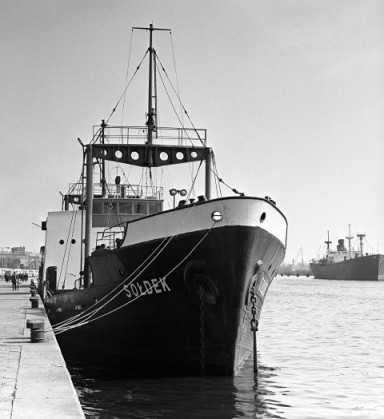
In the first years of the existence of Polska Żegluga Morska P.P., shipowner’s ships proceeded in short- and medium-range relations, focusing mainly on the Baltic Sea and the North Sea. During the first five years of operation, as much as 80% of all cargoes were coal and iron ore. The ships proceeded mainly in the following relations: France, Italy, England, Finland, Germany, Sweden, Portugal and Denmark. Almost 90% of transport is irregular shipping, the remaining 10% was carried out as a regular line on the Szczecin-London-Rouen, Szczecin-Hamburg-Rotterdam-Antwerp and Szczecin-Stockholm routes.
To conquer the oceans
At the end of the fifties, Polska Żegluga Morska P.P. began to expand the territory of operation of its own ships. The cargo offer has also been expanded. In 1958, the steamer Tczew set off on a pioneering journey to Guinea with a cargo of cement. This meant not only the opening of a very profitable West African line, but also the entering of ships into ocean waters. At the end of the fifties, the tonnage of the shipowner and its transport also began to grow dynamically. The development of the fleet was possible among others thanks to the establishment of a dedicated special fund in 1958. PŻM P.P. using these funds purchased 22 ships from the market of the “Liberty” and “Empire” types with a total load capacity of 250,000 DWT by 1963 (during World War II, they proceeded in convoys, transporting army and weapons).
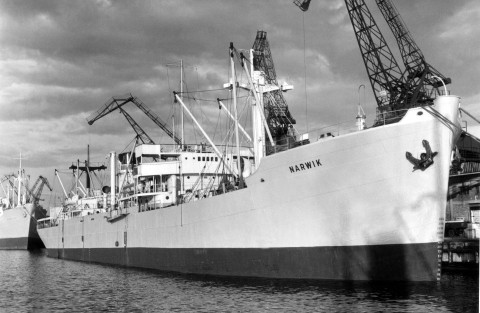
In the 60s, the shipowner entered with tonnage adapted to non-European shipping. In addition to ships from the Fund, the fleet of PŻM P.P. began to be powered by modern bulk carriers, such as those built at the Warski Shipyard in Szczecin and those from Italian and British shipyards.
In the mid-sixties, the tonnage of the company already numbered more than a hundred ships and exceeded the carrying capacity of half a million tons. Significant changes were also made to the operating strategy of the tonnage held. They were mainly related to the extension of travel time and the establishment of new routes. In 1966, PŻM P.P. ships proceeded on their first long voyages to the Far East, starting deliveries of Polish coal to Japan. Also in 1966, the first cargo of grain from the American continent was received. In 1967, the activity in cargo and passenger shipping in the Baltic Sea began, launching the first ferry line from Świnoujście to Ystad. This line was served by the first Polish passenger-car ferry Gryf.
Golden 70s
On January 1, 1970, as a result of the reorganization of the Polish merchant navy, Polska Żegluga Morska P.P. handed over all its general cargo ships and the Gryf ferry to the Polish Ocean Lines. As a result of this reorganization, at the end of 1970, PŻM P.P. had 102 ships with a total carrying capacity of 961 000 tons and employed 4 949 people (in offices and on board).
In the years 1971-1975, as a result of investment activities also related to the concept of importing crude oil to Polish from Iraq, there was a threefold increase in the carrying capacity of the PŻM P.P. fleet. To handle the transport of this cargo, PŻM P.P. has built a fleet of six tankers in Japan and Germany with a carrying capacity of 137 000 to 146 000 tons. At that time, they were the largest vessels that ever sailed in the Polish merchant navy. In total, between 1971 and 1975, the fleet of the shipowner was enriched by 54 ships with a carrying capacity of 2.1 million tons, reaching at the end of 1975 the number of 122 ships and a transport capacity of 2.8 million tons.
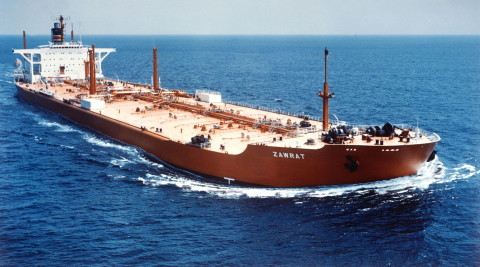
In the seventies, the shipowner’s fleet was enlarged by specialized ships for the transport of liquid sulfur. The shipowner was a leader in this market sector for many years. In addition to traditional cargoes, such as coal and iron ore, grain also began to grow to the rank of strategic cargoes. In 1977, among others, line for transporting of grains from the Great American Lakes to Świnoujście was launched.
Towards more difficult times
The 80s were a period of political and economic changes in Poland. PŻM P.P., which mainly handles cargo of Polish foreign trade, began searching for cargo on the free market. The shipowner’s offer met with the interest of the markets and the transport between foreign ports on behalf of charterers from outside the territory of Poland began to grow exponentially.
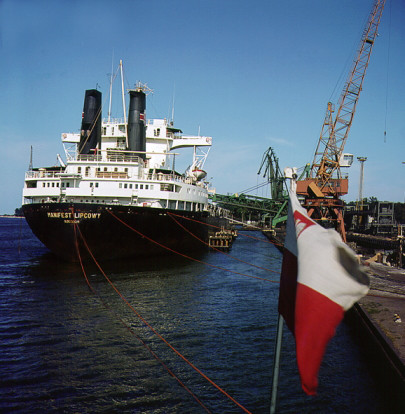
Among others, extensive cooperation was established with the world’s largest suppliers of grain cargo: Cargill, Toepfer and Dreyfus. The transport of steel elements from the Netherlands to the Great American Lakes also began. These transports continue successfully until today, thanks to which most American cars are made of steel, which is brought from Europe to the USA by Polsteam’s ships.
Since the mid-eighties, PŻM P.P. had already carried 50% of its cargo between foreign ports, independently acquiring them on the international market. In 1989, the shipowner carried out its voyages on the basis of free market agreements in amount of 70% of all contracts.
In a free market economy
The beginning of the nineties was a time of further changes in the shipowner’s activity, adapting the shipowner’s structure and fleet to the requirements of the free market economy. In the area of the owned fleet, building of panamax ships was contracted in the Danish shipyard, buildings of bulk carriers were contracted in the Szczecin Shipyard, Bulgarian and Japanese shipyards.
In the structure of company’s office, a decision was made to create a number of specialized companies for shipowner services. The Polsteam Group was headed by the PŻM P.P., bringing together entities dedicated to the operation of bulk tonnage, supply, freight, ferry and other shipowner activities. The construction of the company’s new headquarters – the PAZIM office and hotel complex – has also begun.
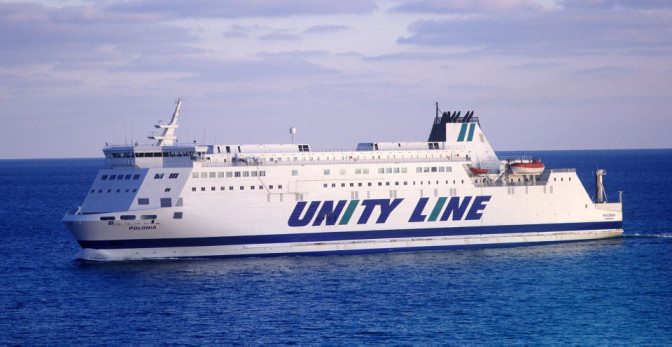
The end of the nineties was a deep financial crisis of the entire Polsteam Group. Low freight market, high burdens associated with running an investment program led the shipowner to serious problems with maintaining liquidity. It was necessary to introduce a restrictive recovery program and to restructure companies’ activities.
In the first decade of the twenty-first century
Consistently implemented corrective actions, liquidation of unprofitable areas of activity and changes in the functioning of company’s structures allowed the shipowner to get out of the crisis. The first sign of the effectiveness of the introduced changes was the launch of a new fleet renewal program launched in 2003. A contract was signed with the Chinese shipyard Xingang in Tianjin for the construction of four bulk carriers with a carrying capacity of 38,000 tons each. These ships began their voyages in 2005.
Since 2004, the Polsteam Group has also started the process of strengthening its share in the shipping market in the Baltic Sea. The project was carried out by Polsteam Group’s company: the Unity Line which was dedicated to the operation of ferry vessels. On the second-hand market, a ro-ro ferry was acquired, which after a thorough modernization took the name Gryf. This ferry entered service in January 2005. In October 2007, another ro-ro ferry called Wolin entered to the line.
In September 2008, a vessel called Skania was also put into operation. She was a complement to the Polonia ferry and proceeded on the route from Świnoujście to Ystad too.
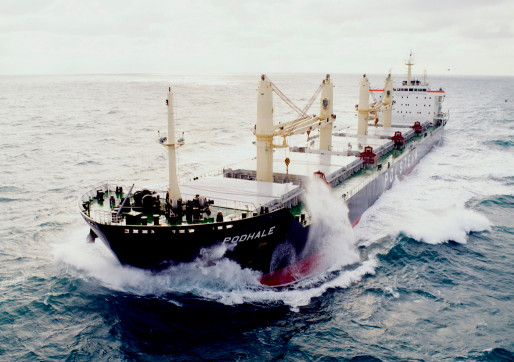
The good financial condition of the company and the need to renew its fleet resulted in the fact that in 2005 the Polsteam Group prepared an investment program assuming the construction of as many as 34 ships by 2015. The first of the contracts, under this program, was signed with the Xingang shipyard in Tianjin for the construction of the second series of ships with a size of 38,000 DWT. The first four of them entered service in 2008. Another five ships in this series were handed over in 2009. In the years 2006-2007, the Group also concluded contracts for the construction of vessels referred to as laker vessels (30,000 DWT – allowed to proceed in the area of the Great American Lakes) and kamsarmax – i.e. bulk carriers with a size of 80,000 DWT and 82,000 DWT.
Last years
The high freight market and the increase in demand for new tonnage prompted the company in 2013 to decision of beginning of the second stage of the investment program and to sell older ships with employment difficulties. In the second stage of the program, universal bulk carriers were ordered in China and adapted for navigation in the Great American Lakes region. According to the plan, these ships were to join the company’s fleet in the years 2015 – 2020.
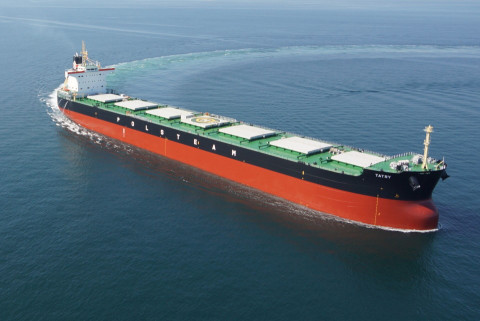
At the end of 2015 the state of the company’s fleet was 61 ships. In the first quarter of 2016, the fleet was enlarged by the first contracted bulk carrier from the second stage of the fleet renewal program. Another one entered service in the third quarter. The deteriorating condition of the freight market, the oversupply of new tonnage, the lack of cargoes caused that the Polsteam Group once again in its history found itself in a situation of loss of financial liquidity. An additional burden was the investment program.
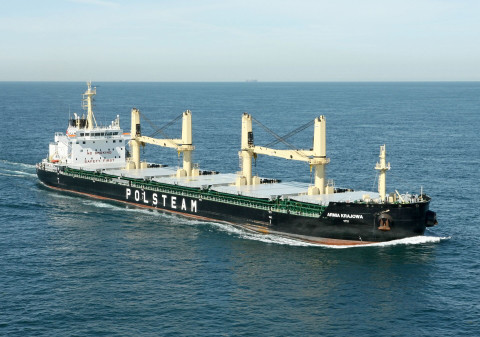
In connection with the deteriorating financial situation of the Polsteam Group, on 20th February 2017, at an extraordinary meeting of the Workers’ Council, the Minister of Maritime Economy and Inland Navigation Marek Gróbarczyk announced the acquisition of the state enterprise PŻM together with other entities belonging to the Group, under a forced administration.
The Administrator appointed by the Minister (Paweł Brzezicki – General Director of PŻM P.P. in the years 1999 – 2004) was obliged to prepare a recovery program, to restructuring the threatened financial liabilities in relation to the operated fleet and to urgently restructure the Group’s operations.
The first actions of the Administrator led to the suspension of the sale of two ships and the commencement of talks with financing institutions in the area of prolongation of repayment of due payments. Subsequently, talks were undertaken with shipyards in which the Polstem Group – due to lack of funds – had left unreceived ships (in various stages of production) from the second stage of the fleet renewal program.
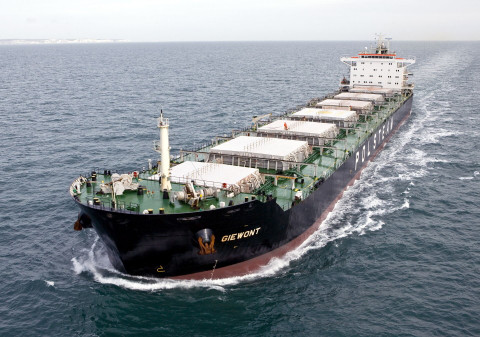
The years 2016 – 2019 were a period of deep restructuring processes in the Group as part of the ongoing recovery program as part of the forced administration. Obtaining new refinancing agreements for existing loans granted for the purchase of the fleet, restoring the company’s market credibility and negotiations with shipyards meant that financial liquidity was maintained without the need to sell the Group’s assets. Some of the contracted ships from the second stage of fleet renewal program were received after negotiating new price conditions. The stabilization of the freight market at a low level but ensuring the profitability of the company’s activity also allowed for talks with shipyards in which ships were contracted as part of the second stage of the fleet renewal program. The result of these activities was the receipt in the years 2017 – 2019 of six universal bulk carriers and three vessels adapted for navigation in the area of the Great American Lakes.
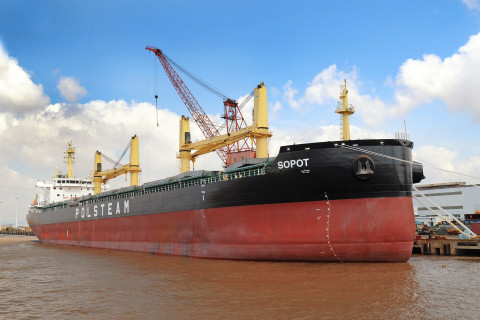
On 13th December 2019, in connection with the stabilization of the financial situation of the Polsteam Group and positive effects of the implemented recovery program, the Minister of Maritime Economy and Inland Navigation decided to terminate the forced administration of the state enterprise PŻM and the Polsteam Group. At the same time, the Interim Manager of the company was appointed (Maria Skubniewska – Director of Ownership Supervision at MGMiŻŚ), whose task was to restore the statutory bodies of the company, i.e. the Workers’ Council and supervise the conduct of the competition for the position of The General Director of PŻM P.P.
Due to the COVID-19 pandemic lasting in 2020, the elections to the Workers’ Council, the constitution of this body and the conduct of the competition for the position of the General Director of PŻM P.P. ended not until June 2020.
On 8th June 2020, the Workers’ Council approved the candidacy of Andrzej Wróblewski for the position of the new director of PŻM P.P.. The recommendation of this candidate was submitted to the Workers’ Council by the selection board, appointed to select the new director of the company, composed of representatives of the Ministry of Maritime Economy and Inland Navigation and representatives of the Workers’ Council of PŻM P.P..
The COVID-19 pandemic has caused collapses in many markets and sectors of the global economy, including the field of bulk cargo transport. The low level of the freight market and the deteriorating financial situation meant that in the first days of taking up the function, the General Director took decisive steps to maintain the Group’s liquidity level.
On 19th January 2021, the Workers’ Council of PŻM P.P. adopted the investment activity plan of the Polsteam Group for the years 2020-2025, submitted by the General Director. The strategy is based on the development of the Group’s traditional sectors, i.e. operation of bulk carriers and ferries, and the development of activities supporting operations.
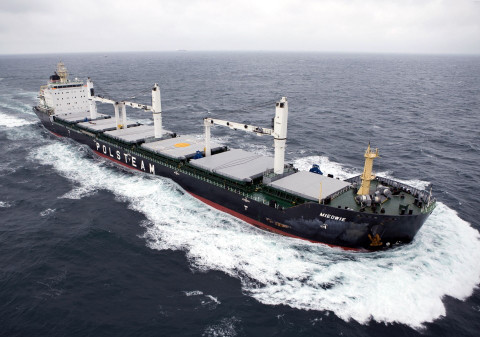
For the years 2020-2025, the Polsteam Group is planning to start replacing ships with new ones and strengthen its position on the market in the Great American Lakes region. Currently, in the transport sector on the Lakes, the Group is among the leaders. It is necessary to maintain this position and introduce new ships in place of the older ones. New requirements in the freight market, a large amount of new tonnage also cause that among charterers the acceptance of ships over 20 years old has decreased significantly. At 31.12.2021, the average age of tonnage operated by the Group was 10 years. However, it is necessary to take investment measures taking into account the shipbuilding production cycle, sell older ships and replace them with modern tonnage, meeting the growing environmental requirements.
In the cargo/ passenger transport sector, the Group is intending to take steps to exchange its tonnage. In this area, conditions and needs are also determined by the market. There is a need for new, large ferry vessels with environmentally friendly propulsion in the Baltic Sea area. Favorable road infrastructure, increase in traffic and truck transport possibilities, fast transfer in the corridor Świnoujście – Sweden causes that there is a constant increase in interest in this form of transport. In order to meet these demands, the Polsteam Group must take quick investment steps to maintain its position in the Baltic Sea.
Changing markets, new customer requirements, environmental protection regulations, the need to modernize company’s services are the main determinants of the concept of developing specialized entities within the Polsteam Group.
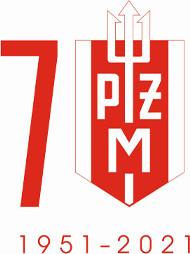
Ryszard Karger
The most important figure in the history of PŻM
Ryszard Karger, General Director of PŻM P.P. in the years 1964 – 1969 and again in the years 1976 – 1985 was the main creator of the transformation of PŻM P.P. from a local shipping company into a large international shipowner. He was also the longest-serving General Director of the company and the only one to hold this position twice.
During his long professional career, Ryszard Karger made many courageous decisions that made Polska Żegluga Morska P.P. a showpiece of Poland on international markets. He inaugurated the so-called anti-charter campaign, thanks to which PŻM P.P. left the Baltic market for the wide oceans and signed one of the most important investment contracts with British shipyards in the history of the company. It was Ryszard Karger who created the West African line, which has been successfully connecting Szczecin with the African ports of for over 50 years. Also on his initiative, the first ferry connection between Świnoujście and the port of Ystad in southern Sweden was launched. All these activities were milestones in the development of Polsteam and thanks to them the company could develop and recruit thousands of new employees.
